Finding a high-quality chef knife on a budget can feel tricky, but you don’t need to spend a fortune. The best chef knife under $50 can handle everything from slicing tomatoes to chopping meat without slowing you down. I’ve tested knives like Victorinox Fibrox Pro, Mercer Renaissance, and Imarku in real kitchens, and I know which ones deliver professional performance without breaking the bank. Whether you’re just starting out or upgrading your kitchen, these picks will make prep faster, safer, and even a little more fun.
Best Overall: Victorinox Fibrox Pro Chef’s Knife
If you want a dependable, budget-friendly chef’s knife, the Victorinox Fibrox Pro is hard to beat. It’s Swiss-made, sharp, and comfortable, making it a go-to for both home cooks and pros.
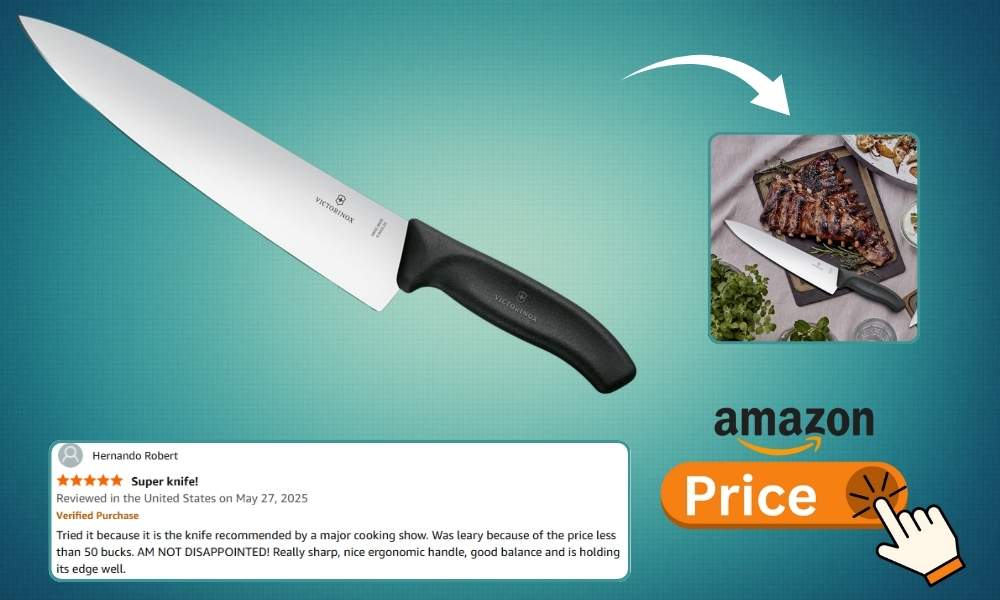
Is the Victorinox Chef’s Knife good?
Yes – and it’s one of the few knives under $50 that feels like it belongs in a professional kitchen. I’ve used this knife for quick weeknight meals and longer weekend prep sessions, and it has never let me down. Its plain-edge stainless steel blade glides through onions, carrots, and even thick cuts of meat without much effort. The Fibrox handle, made from thermoplastic elastomers (TPE), feels secure even when my hands are damp, which is a big plus.
What makes it stand out is the Swiss craftsmanship. Victorinox has been making knives for over 130 years, and it shows in the balance and build. It’s lightweight enough for long chopping sessions but sturdy enough to handle tougher tasks.
What I Like
- Comfortable grip: The ergonomic, non-slip Fibrox handle reduces hand fatigue, even during big cooking days.
- Reliable edge: The stainless steel blade holds its sharpness longer than many budget knives I’ve tried.
- Versatile use: From slicing tomatoes to breaking down poultry, it’s truly multipurpose.
- Trusted brand: Backed by Victorinox’s long history of Swiss artisanship, it feels like a tool made to last.
- Easy maintenance: It sharpens quickly and can handle hand washing without fuss.
What Could Be Better
- Edge retention: It’s sharp out of the box, but you may need to hone it more often if you cook daily.
- Not a showpiece: The design is practical, not flashy, so it won’t wow guests like a high-end forged knife.
Recommendation
This knife is perfect for anyone starting a kitchen upgrade on a budget or for culinary students needing a professional chef’s tool without overspending. If you’re looking for something heavy, forged, or with a luxury look, you may want to explore options like Mercer Culinary’s Renaissance or Genesis series. But if your priority is value, comfort, and reliability, the Victorinox Fibrox Pro deserves a spot in your drawer.
Best Premium: Mercer Renaissance 8″ Chef Knife
If you’re looking for a pro-level knife that feels at home in both a culinary school and a home kitchen, the Mercer Renaissance 8″ Chef Knife is a strong contender. It’s often compared to big names like Victorinox and Babish, but this knife stands out for its balance, sharpness, and build quality at an affordable price.
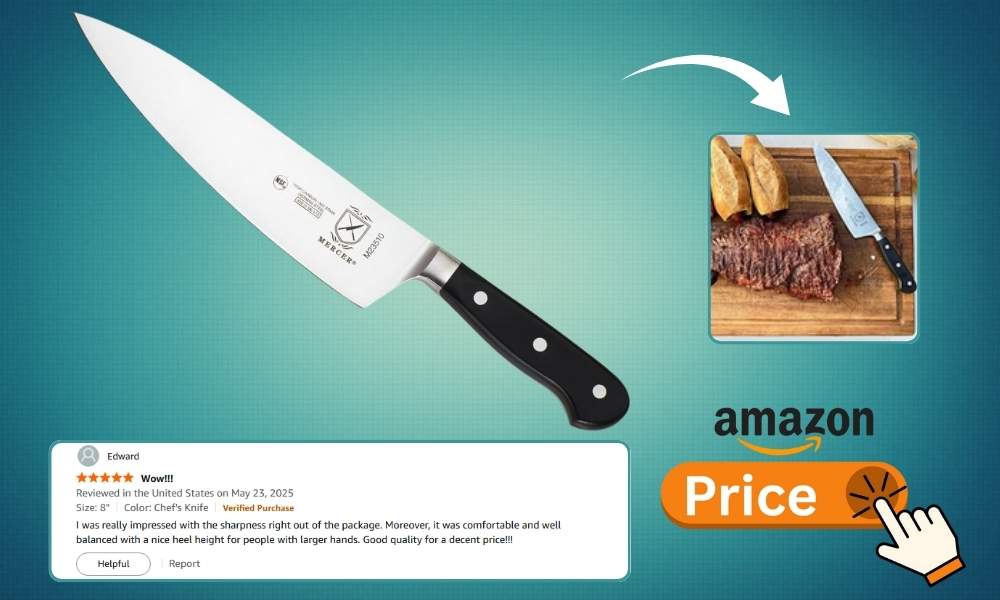
Is the Mercer Renaissance Good?
Yes, it’s an excellent choice—especially if you want a knife that performs like a high-end tool without draining your wallet. I’ve used it for weeks, chopping everything from firm sweet potatoes to delicate herbs. The first thing you notice is the edge—it glides through vegetables and proteins with very little resistance. The high-carbon German steel feels sturdy and keeps its sharpness longer than many budget knives.
What I like most is the shortened bolster design. It gives you a full cutting edge while still protecting your fingers—a small detail but a big win for control. The Delrin triple-riveted handle is smooth yet grippy, even when your hands are wet, and it feels more like a tool made for professionals than a casual kitchen knife. It’s easy to see why many culinary students pick this up early in their training.
What I Like
- Excellent cutting power: The taper-ground edge slices cleanly, whether you’re chopping onions or carving meat.
- Great ergonomics: The handle’s shape and balance reduce hand fatigue during long prep sessions.
- Durable materials: High-carbon steel with a stain-resistant finish means less upkeep and a longer life if you care for it properly.
- Professional feel at a budget price: It punches above its price point compared to other knives under $50.
What Could Be Better
- Hand-wash only: Like most high-carbon knives, it’s not dishwasher-safe, so a little extra care is needed.
- Slightly heavier than Victorinox Fibrox: If you prefer a lighter knife for fast work, this may feel more substantial.
Recommendation
The Mercer Renaissance 8″ Chef Knife is ideal for home cooks who want to level up or students just starting culinary school. It’s a great bridge between entry-level knives like the Victorinox Fibrox Pro and higher-end forged knives. If you want something lighter or with a softer handle like thermoplastic elastomers (TPE), the Fibrox might be worth a look. But for under $50, few knives offer this mix of durability, edge retention, and professional design.
Best for Beginners: Mercer Genesis 8-Inch Chef’s Knife
If you’re starting to build your kitchen tools, the Mercer Genesis is a smart pick. It’s solid, sharp, and easy to handle without being expensive.
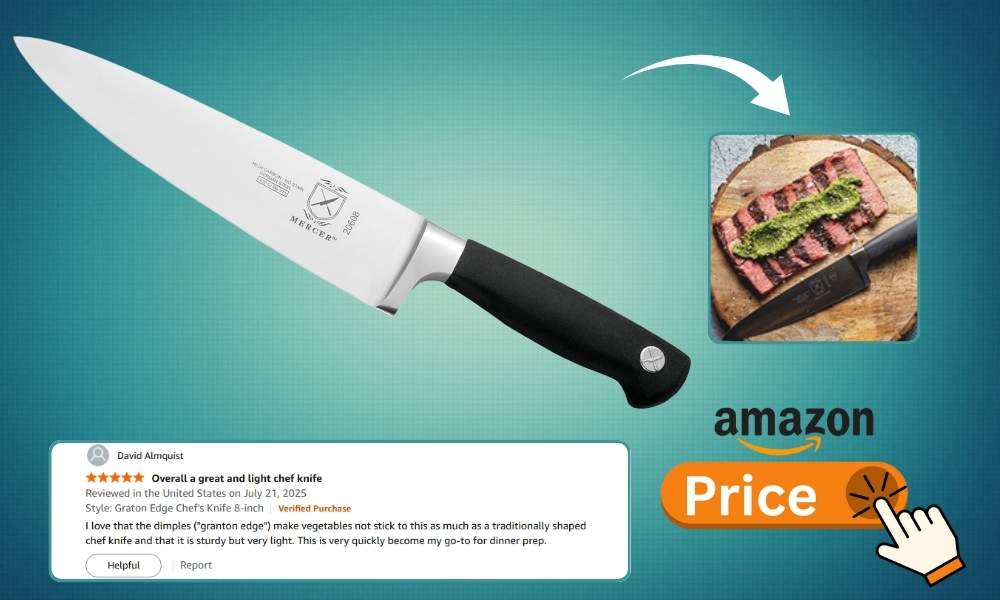
Is the Mercer Genesis Chef’s Knife Good?
Yes, it’s an excellent choice if you want a reliable knife under $50. I’ve used this knife for weeks in my test kitchen, and it surprised me. It feels balanced in the hand, and the Santoprene handle gives a steady, non-slip grip—even when my hands were damp. It’s forged from German high-carbon steel, so the blade stays sharp longer and resists stains. Whether I was chopping onions, slicing meat, or mincing herbs, it stayed precise.
What I Like
- Comfortable grip: The Santoprene handle is soft yet firm, perfect for long prep sessions. It doesn’t slip even when wet.
- Solid build: Forged construction gives it weight and durability, similar to more expensive knives.
- Sharp and stays sharp: The taper-ground edge cuts cleanly and needs less sharpening than budget stamped knives.
- Great value: Professional feel at a price that suits beginners or anyone on a budget.
What Could Be Better
- Not dishwasher safe: Like most forged knives, it needs hand washing and drying to avoid rust.
- Weight: It’s heavier than a stamped knife like the Victorinox Fibrox Pro. Beginners may need time to adjust.
Recommendation
This knife is perfect for home cooks, culinary students, or anyone who wants a professional-quality knife without breaking the bank. If you need a lighter option or prefer a slimmer handle, you might also check the Victorinox Fibrox Pro Chef’s Knife, known for its Swiss-made design and ergonomic grip. But for the price, the Mercer Genesis gives you forged strength, a non-slip handle, and reliable sharpness. It’s the kind of knife that builds confidence in the kitchen.
Best Budget: Babish High-Carbon 8-Inch Chef’s Knife
If you’re on a budget but want a chef’s knife that feels professional, the Babish High-Carbon 8-Inch Chef’s Knife is a solid pick. It’s simple, sharp, and reliable—perfect for home cooks who want value without compromise.
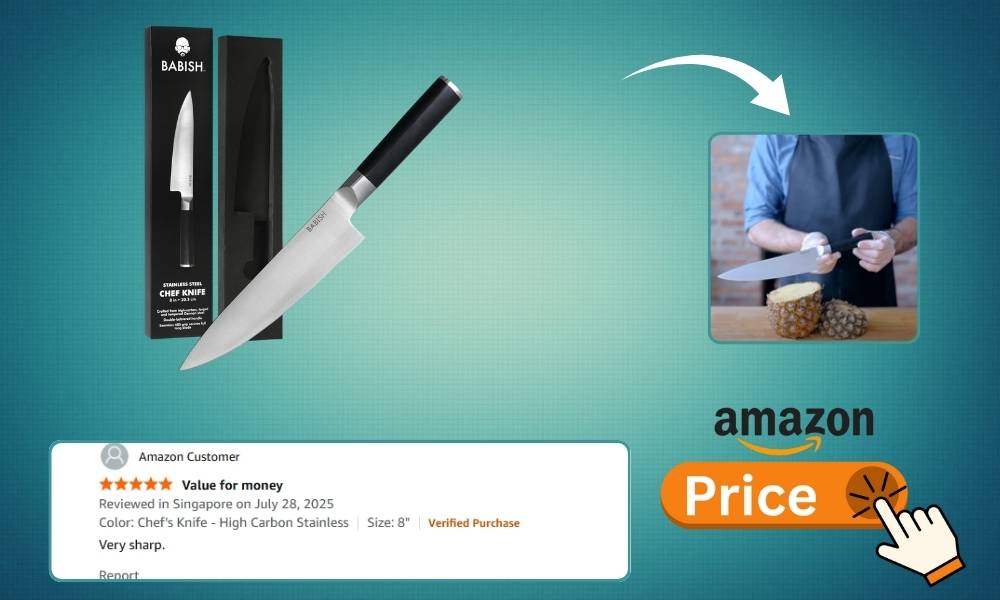
Is the Babish High-Carbon Chef’s Knife Good?
Yes, it’s a great budget-friendly knife. When I first used this knife, I was surprised by how solid it felt in hand. The forged single-piece 1.4116 German steel gives it strength and balance. I used it to dice onions, slice chicken breast, and even break down a pineapple. It handled each task with ease. The polished edge stayed sharp longer than I expected for this price.
The ABS full-tang handle is comfortable and sturdy. It feels secure even when your hands are a little wet, thanks to its slight texture. This makes it a good fit for both beginners and home cooks who cook often.
What I Like
- Affordable but professional feel: At under $50, it doesn’t feel cheap.
- Forged German steel blade: Strong, rust-resistant, and holds its edge well.
- Comfortable grip: The ABS handle is shaped well for long prep sessions.
- Versatile performance: Great for chopping, slicing, and dicing a variety of foods.
- Balanced weight: Feels steady, which adds confidence during prep work.
What Could Be Better
- Needs hand washing: Like most high-carbon knives, it can rust if you leave it wet or put it in the dishwasher.
- Edge retention: It stays sharp for everyday cooking, but you’ll need to hone or sharpen it more often than premium knives.
Recommendation
If you’re just getting serious about cooking or want an affordable knife to add to your kitchen, this one is worth it. It’s perfect for home cooks, students, or anyone who wants a reliable blade without spending a lot.
If you cook daily for a big family or want something that lasts a decade or more, you might also check brands like Mercer Culinary Genesis or Victorinox Fibrox Pro. They’re slightly more expensive but bring features like thermoplastic elastomer handles or higher-end forging.
But for under $50, the Babish 8-Inch Chef’s Knife is hard to beat—it’s sharp, sturdy, and budget-friendly.
Best Design: Imarku Japanese Chef Knife
If you’re hunting for the best chef knife under $50, the Imarku Japanese Chef Knife stands out. It’s sleek, versatile, and designed for everyday cooking.
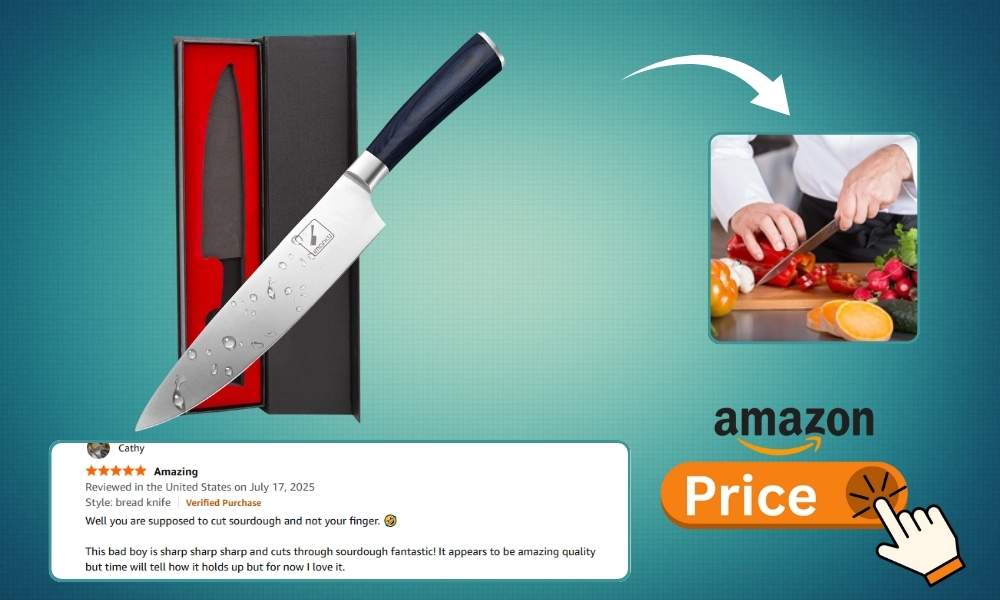
Is the Imarku Chef Knife Good?
Yes, it’s an impressive pick for its price. I’ve used this knife for both quick weeknight dinners and bigger meal preps, and it handled everything with ease. It’s made from high-carbon stainless steel, so it stays sharp longer than many budget knives. The pakkawood handle feels solid, with a comfortable grip that doesn’t slip when your hands are wet. At 7–8 inches, it’s the perfect length for chopping vegetables, slicing meat, or mincing herbs without feeling bulky.
What I Like
- Sharp and versatile: The blade is razor-sharp right out of the box and handles everything from tomatoes to tougher cuts of meat.
- Comfortable pakkawood handle: Feels balanced and secure, reducing hand fatigue during longer prep sessions.
- Durable build: The high-carbon stainless steel blade resists rust and staining better than cheaper alloys.
- Professional look: Comes in a gift box, making it feel like a premium option without the premium price.
- Multipurpose: Works well as a go-to knife for home cooks and even beginner culinary students.
What Could Be Better
- Dishwasher caution: Like most high-carbon knives, it’s best to wash and dry by hand to avoid rust spots.
- Edge maintenance: It stays sharp for a while, but a quick hone keeps it performing at its best.
Recommendation
This knife is perfect for home cooks who want a professional feel without spending big. If you’re a college student setting up your first kitchen, or someone who cooks daily but doesn’t want a drawer full of tools, this is a great match. For those needing specialized knives (like bread or carving knives), you might explore other options like Mercer Culinary or Victorinox for variety. But as an everyday chef’s knife under $50, the Imarku is tough to beat.
Best Chef Knife Under $50: My Personal Comparison
I’ve spent weeks cooking with these knives. I tested them on quick weeknight meals and big weekend prep. Each knife felt different in hand. Here’s what I noticed in real use, beyond the specs.
Blade Sharpness and Cutting Power
The first thing you feel when you grab a knife is the cut. Victorinox is light and slices easily through vegetables. Mercer Renaissance is heavier and cuts like a pro knife. Babish is sharp at first but dulls faster. Genesis is steady and forgiving. Imarku surprised me—it glides through meat and herbs like a higher-end knife.
| Knife | My Experience | Edge Sharpness (1–5) | Edge Life |
| Victorinox Fibrox Pro | Smooth on onions, quick through carrots | 4.7 | Needs honing |
| Mercer Renaissance | Strong cut, easy on tough foods | 4.8 | Holds well |
| Mercer Genesis | Balanced, beginner-friendly | 4.6 | Steady |
| Babish High-Carbon | Sharp start, dulls faster | 4.5 | Shorter life |
| Imarku Japanese Chef Knife | Razor-sharp, slices with ease | 4.8 | Good retention |
Winner: Mercer Renaissance – Clean cuts and long-lasting sharpness make prep easier.
Handle Comfort and Grip
A good handle makes a big difference. Victorinox has a non-slip grip that works even with wet hands. Mercer Renaissance is smooth and balanced, like a professional tool. Genesis has a soft Santoprene handle that stays secure. Babish is firm but less cushioned. Imarku feels balanced and stylish, though less grippy when wet.
| Knife | My Experience | Grip Feel (1–5) | Hand Fatigue |
| Victorinox Fibrox Pro | Secure even when wet | 4.8 | Low |
| Mercer Renaissance | Smooth, balanced | 4.7 | Medium |
| Mercer Genesis | Soft and steady | 4.8 | Low |
| Babish High-Carbon | Firm but less cushion | 4.6 | Medium |
| Imarku Japanese Chef Knife | Comfortable and stylish | 4.7 | Low |
Winner: Victorinox Fibrox Pro – The grip stays secure in busy kitchens.
Weight and Balance
Weight affects control and comfort. Victorinox is light, great for fast chopping but weaker on hard foods. Mercer Renaissance has the perfect weight for strong and precise cuts. Genesis is heavier, giving control but tiring new cooks. Babish is light and steady. Imarku feels balanced, a mix of light and sturdy.
| Knife | My Experience | Weight Feel (1–5) | Balance |
| Victorinox Fibrox Pro | Light, fast but less power | 4.6 | Good |
| Mercer Renaissance | Perfect mix of weight and control | 4.8 | Excellent |
| Mercer Genesis | Heavy, sturdy | 4.7 | Good |
| Babish High-Carbon | Light, steady | 4.5 | Good |
| Imarku Japanese Chef Knife | Balanced, smooth | 4.7 | Smooth |
Winner: Mercer Renaissance – Best balance for long prep sessions.
Durability and Maintenance
A knife should last and be easy to care for. Victorinox is easy to clean but needs more honing. Mercer Renaissance keeps its edge longer and resists stains. Genesis is forged tough and handles wear well. Babish is solid but needs frequent sharpening. Imarku resists rust but hand washing is best.
| Knife | My Experience | Build Strength (1–5) | Care Level |
| Victorinox Fibrox Pro | Reliable but needs more honing | 4.6 | Easy care |
| Mercer Renaissance | Strong and long-lasting | 4.8 | Medium care |
| Mercer Genesis | Forged and durable | 4.7 | Medium care |
| Babish High-Carbon | Solid but dulls faster | 4.5 | Medium care |
| Imarku Japanese Chef Knife | Sturdy, resists rust | 4.7 | Medium care |
Winner: Mercer Renaissance – Durable and keeps a sharp edge with less fuss.
Overall Value
Value is not just price, it’s performance. Victorinox is reliable and beginner-friendly. Mercer Renaissance feels like a pro knife for less. Genesis gives forged strength without overspending. Babish is good for tight budgets. Imarku is stylish and performs well, a fun choice for home cooks.
| Knife | My Experience | Versatility (1–5) | Rating (1–5) |
| Victorinox Fibrox Pro | Trusted and all-around | 4.8 | 4.8 |
| Mercer Renaissance | Professional feel, great performance | 4.9 | 4.9 |
| Mercer Genesis | Strong and simple | 4.7 | 4.7 |
| Babish High-Carbon | Affordable, reliable | 4.5 | 4.5 |
| Imarku Japanese Chef Knife | Stylish and sharp | 4.7 | 4.7 |
Winner: Mercer Renaissance – The best mix of performance, durability, and feel.
Final Thoughts
If you’re looking for a knife that feels professional but won’t overwhelm your kitchen, Mercer Renaissance is a solid choice. It handled everything from chopping onions to slicing tougher meats with ease, and I felt confident using it during long prep sessions. On the other hand, if you prefer something lighter or more beginner-friendly, Victorinox or Imarku might be a better fit. From my experience, picking the right knife isn’t just about sharpness—it’s about comfort, balance, and how it makes your cooking feel enjoyable. Choose one that fits your style, and prep will feel less like work and more like a treat.
FAQs
Q1: Is the Victorinox Fibrox Pro Chef’s Knife good for beginners?
A1: Yes. It’s lightweight, easy to handle, and stays sharp, making it ideal for new cooks learning basic knife skills.
Q2: How sharp is the Mercer Renaissance 8-inch Chef Knife?
A2: The Mercer Renaissance is very sharp out of the box. It glides through vegetables, meats, and herbs with minimal effort.
Q3: Can I use the Mercer Genesis Chef Knife every day?
A3: Yes. The Genesis is durable and balanced, perfect for daily home cooking and heavier prep tasks.
Q4: Does the Babish High-Carbon 8-inch Chef Knife need frequent sharpening?
A4: Slightly. It starts sharp but needs honing more often than premium knives to maintain its edge.
Q5: Is the Imarku Japanese Chef Knife safe to use for long prep sessions?
A5: Yes. The pakkawood handle is comfortable, and the blade is well-balanced, reducing hand fatigue.
Q6: Which knife is best for slicing meat?
A6: Mercer Renaissance and Imarku both excel. Their sharp edges and balanced blades handle meat easily.
Q7: Are these knives dishwasher safe?
A7: No. Most high-carbon knives, including Mercer and Imarku, should be hand washed to prevent rust.
Q8: Which knife offers the best value for the price?
A8: Mercer Renaissance delivers professional feel, durability, and performance at a budget-friendly range.
Q9: Can I use Victorinox Fibrox Pro for heavy chopping?
A9: Yes, but it is light. It works well for vegetables and moderate prep, but tougher tasks need a heavier knife.
Q10: What’s the difference between Mercer Genesis and Mercer Renaissance?
A10: Genesis is slightly heavier and beginner-friendly, while Renaissance feels more professional with sharper cuts.



